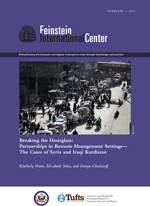International organizations increasingly rely on local partners to engage in humanitarian action. This is particularly the case in highly insecure situations or when host governments limit or deny international access. Despite these trends, there have been few attempts to examine the effectiveness of international-local partnerships either in general or in insecure “remote management” contexts. This study explores these partnerships in the setting of cross-border assistance from Turkey to Syria in 2014. The case of Iraqi Kurdistan provides historical perspective. We used a paired longitudinal sample of international and Syrian organizations to generate qualitative data over a ten month period. Interviews with another 37 national and international organizations provide additional context. The report examines the nature of partnerships in remote management settings, the identification of local partners, capacity building, monitoring and evaluation, donor requirements, and donor withdrawal. The cultural importance of trust and differing experiences of insecurity are themes throughout the report. We conclude with recommendations for donors, international organizations, and national actors for improving their partnership approaches.
See the first briefing paper for insights about overcoming challenges in remote management settings, including information about how international organizations identify local partners, build the capacity for local organizations, and develop trust.
See the second briefing paper for information about the sustainability of local organizations in the face of donor withdrawal in Syria and Iraqi Kurdistan.







